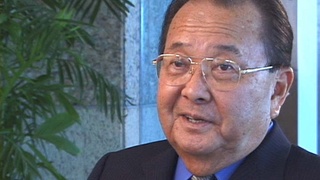Interviews
Introduction to Film
The reason I really took to animation is was the first film I saw was Snow White in camp. You know from all my ten cent saving, of the thing, it only cost ten cents a ticket. You know, so my brother and I we both bought tickets at the mess hall. You know they were selling tickets, you see. But you had to walk all the way, almost across town, to get to the, there's the only color theater, you know, so where they show feature films on sixteen millimeter, you know.
So I, I...my brother and I we bought a ticket and we went to the cinema, or the theater, and I lost my ticket on the way, you know. So I was in tears, I said, my brother said, "I'm going in so you just go home." You know? So I was walking home but I traced, this is the honest truth, I traced my path, I walk, I'm coming back, and I find my ticket on the ground. 'Cause I kinda felt I was pulling some paper or hanky or something out of my pocket and it was, my ticket was there. I ran back. I was just in time to see the film and I saw the Snow White. And I thought, God this was the best thing ever, that I ever seen, and I wanted to be an animator.
Date: June 29, 2012
Location: California, US
Interviewer: Chris Komai, John Esaki
Contributed by: Watase Media Arts Center, Japanese American National Museum
Explore More Videos





Recalling Pinedale and Tule Lake concentration camps
Judge, only Japanese American to serve on CWRIC.

Attempts to sign up for military service
(1917 - 2004) Political activist




Loyalty questionnaire
(1916-2010) draft resister, helped form the Heart Mountain Fair Play Committee

Fair Play Committee
(1916-2010) draft resister, helped form the Heart Mountain Fair Play Committee

Speaking out in camp
(1916-2010) draft resister, helped form the Heart Mountain Fair Play Committee

Wanting to take a stand
(1916-2010) draft resister, helped form the Heart Mountain Fair Play Committee

Ostracized by the camp newspapers
(1916-2010) draft resister, helped form the Heart Mountain Fair Play Committee

On trial for draft evasion
(1916-2010) draft resister, helped form the Heart Mountain Fair Play Committee
